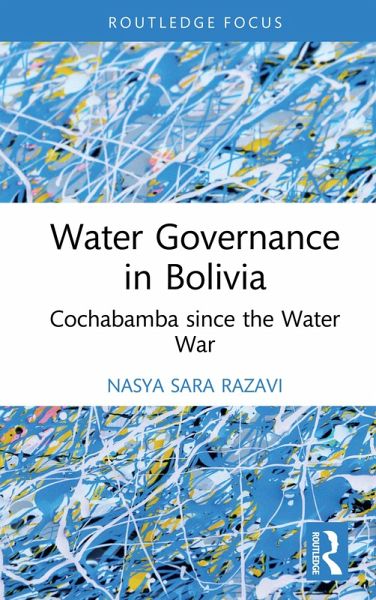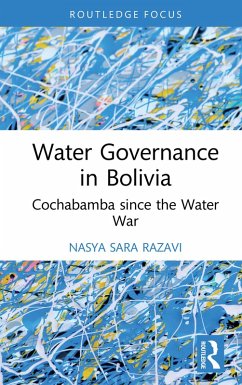
Water Governance in Bolivia (eBook, ePUB)
Cochabamba since the Water War
Versandkostenfrei!
Sofort per Download lieferbar
19,95 €
inkl. MwSt.
Weitere Ausgaben:

PAYBACK Punkte
10 °P sammeln!
This book examines water remunicipalization in Cochabamba since the Water War, offering innovative methodological and theoretical conceptualizations of what it means to be "public," helping to move debates on water services beyond the paralyzing binary of public versus private with a focus on the contested terrain of community engagement around water services.The Cochabamba Water War of 2000 brought together city residents of all stripes to mobilize against water privatization and gain back public control of the city's water utility. This event catapulted anti-privatization movements around th...
This book examines water remunicipalization in Cochabamba since the Water War, offering innovative methodological and theoretical conceptualizations of what it means to be "public," helping to move debates on water services beyond the paralyzing binary of public versus private with a focus on the contested terrain of community engagement around water services.
The Cochabamba Water War of 2000 brought together city residents of all stripes to mobilize against water privatization and gain back public control of the city's water utility. This event catapulted anti-privatization movements around the world, but two decades later, the water movement's vision of democratic water provision remains largely unfulfilled and the city suffers from a protracted water crisis. Building a typology of participation, this book explores the difficulty in rebuilding a strong public water service in Cochabamba by analyzing the different, and often incompatible, understandings and interpretations of social control and public participation. Applying this framework to the Bolivian context, and more specifically to the water and sanitation sector in Cochabamba, the book uncovers whose interests are served, and which groups are included or excluded from decision-making and access to water. This exercise illustrates how, in their implementation, participatory practices are not linear and can be distorted or appropriated towards different ends.
This book will be of great interest to students and scholars of water governance, natural resource management, public policy, social movements and Latin American studies.
The Cochabamba Water War of 2000 brought together city residents of all stripes to mobilize against water privatization and gain back public control of the city's water utility. This event catapulted anti-privatization movements around the world, but two decades later, the water movement's vision of democratic water provision remains largely unfulfilled and the city suffers from a protracted water crisis. Building a typology of participation, this book explores the difficulty in rebuilding a strong public water service in Cochabamba by analyzing the different, and often incompatible, understandings and interpretations of social control and public participation. Applying this framework to the Bolivian context, and more specifically to the water and sanitation sector in Cochabamba, the book uncovers whose interests are served, and which groups are included or excluded from decision-making and access to water. This exercise illustrates how, in their implementation, participatory practices are not linear and can be distorted or appropriated towards different ends.
This book will be of great interest to students and scholars of water governance, natural resource management, public policy, social movements and Latin American studies.
Dieser Download kann aus rechtlichen Gründen nur mit Rechnungsadresse in A, B, BG, CY, CZ, D, DK, EW, E, FIN, F, GR, HR, H, IRL, I, LT, L, LR, M, NL, PL, P, R, S, SLO, SK ausgeliefert werden.













